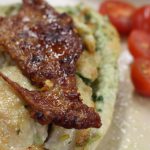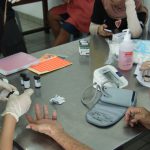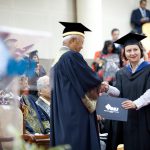Oftentimes, doctors are expected to have basic human values: such as high patience and tolerance, empathy, caring, culturally sensitive, and above all, the ability to show a sense of appreciation. These aspects of skills are what the humanities curriculum at the International Medical University (IMU) is positioned for. Humanities have long been known to show a significant role in medical education (Petrou, L et al., 2021). At IMU, humanities courses are integrated into the medical, dentistry, and health sciences programmes in the early semesters. These courses are fundamental in the development of students’ professional values and interpersonal skills. On 25 March 2022, the Centre for Bioethics and Humanities (CBH) organised its 14th Virtual Humanities Day. Many virtual activities in the areas of history, philosophy, ethics literature, creative innovation, and fine arts were conducted. It was a noteworthy occasion as Semester One students from the Medicine, Dentistry, Pharmaceutical Chemistry, and Chiropractic programmes were actively involved in these virtual activities. The event was marked with further significance as students from the two new modules Penghayatan Etika dan Peradaban and Philosophy and Current Issues also joined in to demonstrate their skills and knowledge.
| Philosophy and Current Issues |
|---|
| The one-day event started with virtual debates coordinated by Muhammad Atlizan Darlis in the Philosophy and Current Issues module. Students presented their discussions and disputes on the topic ‘Philosophical Analysis: Evidence-based Medicine.’ One student was quoted as saying, “This debate session trained us, the future leaders, to think and produce ideas effectively and thoughtfully.” In this module, students are also exposed to the aspects of the relationship between humans and its implications for the environment, in which topics such as philosophy in life, the concept of man, as well as ethics as a philosophical issue are discussed. |
| Arts Appreciation |
| Besides virtual debates, students also participated in virtual exhibitions. Guided by Dr Sheba D.Mani, students from the Arts Appreciation module were given a platform to demonstrate their artistic expressions. Titled as ‘Stories on Self-Discovery: A Journey that does not End”, students were thrilled to display various range of artistic expressions that have helped them to discover their inner selves. In addition, students of this module also learn to develop a critical understanding of the arts by analysing its aesthetic values and meaning through skills such as observing, reflecting, and evaluating, which enhances them to acquire a broader perspective on the human condition. |
| Art Fundamentals |
| Meanwhile, students from the Art Fundamentals module conducted presentations that explored the elements and principles of arts used in art pieces inspired by nature. Under the guidance of Priscilla Philip and based on the theme ‘Flora and Fauna-Me’, students critically examined how these elements of arts worked in influencing the thoughts and feelings toward identity. Another learning activity that students of this module are engaged in their learning is designing and compositing artworks with the aim to develop students’ personal aesthetics. |
| History of Medicine |
| Equally interesting was the virtual presentation organised by students from the History of Medicine module. Guided by Dr. Thulasimani Munohsamy and based on the topic ‘Greatest Medical Invention that Changed the World’, students worked together to analyse and present significant inventions that transformed the methods of diagnosis and treatments in the field of medicine. This module allows students to develop deeper understanding on ancient civilizations that made significant contributions in healthcare. Students are exposed to major discoveries, inventions, and advances in medicine in these civilizations, which will be examined in its cultural context. |
| Thinking Critically and Creatively |
| The final highlight of the event involved students from the Thinking Critically and Creatively module. Guided by both Dr Arlini Alias and Carol Chin Koon Poh, students showcased innovative designs of health solutions that could potentially address health problems in the society. This platform has proven to be beneficial for the students as they got to learn more about the design thinking approach and sharpen their critical thinking skills. As commented by a student, “The project was thought-provoking and made the idea of critical thinking even more interesting.” Interestingly, in this module, students are also provided various platforms to apply theories and concepts related to critical and creative thinking skills such as inferring, evaluating, judging and solving health-related problems through written assignment and individual presentation. Students learn to develop well-informed judgments and present sound arguments for decision-making through topics such as types of reasoning, design thinking approach, problem solving through case study. |
Written by, Dr Arlini binti Alias, Programme Director (MPU) & Lecturer, Centre for Bioethics and Humanities. For more information contact us at [email protected]















